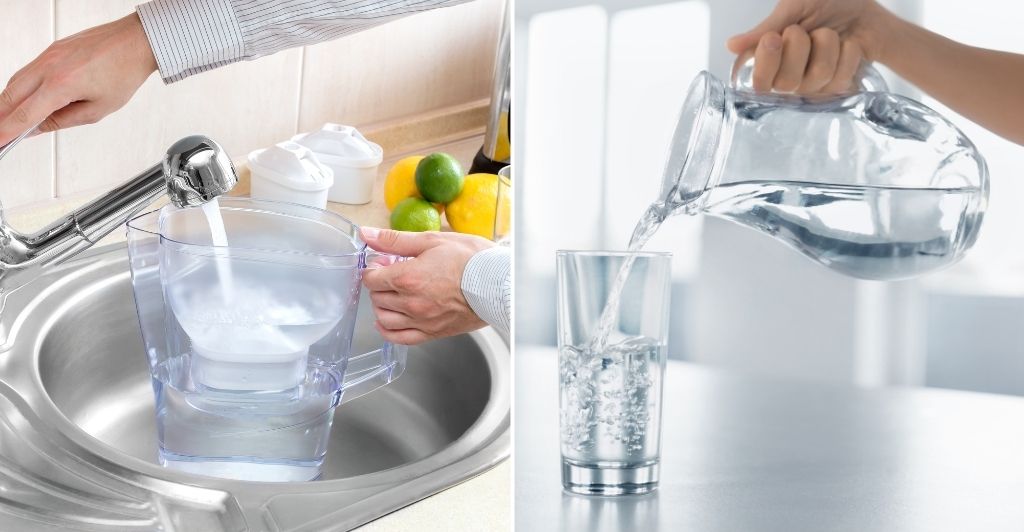Let’s face it: most of us don’t like the taste of tap water. If you’re one of us and want to switch from tap water or bottled water, we’re sure that you’re thinking about getting a water filtration system at home. Tap water contains many contaminants that aren’t good for your health.
These contaminants can make your water taste and smell bad as well. Water filtration systems can be an expensive solution, but they prove to be cost-effective in the long run. Faucet filters and water pitchers are two top-rated and affordable options to consider while getting a water filter for your house.
Both these filters work similarly, and it can be challenging to choose among them. This guide will investigate the differences between water pitcher vs faucet filter along with their benefits and drawbacks.
Water Pitchers
Water pitchers come equipped with a filter cartridge that cleans the tap water when it flows from the pitcher’s upper reservoir to the water tank. Water filter pitchers ensure that the water smells and tastes clean and fresh.
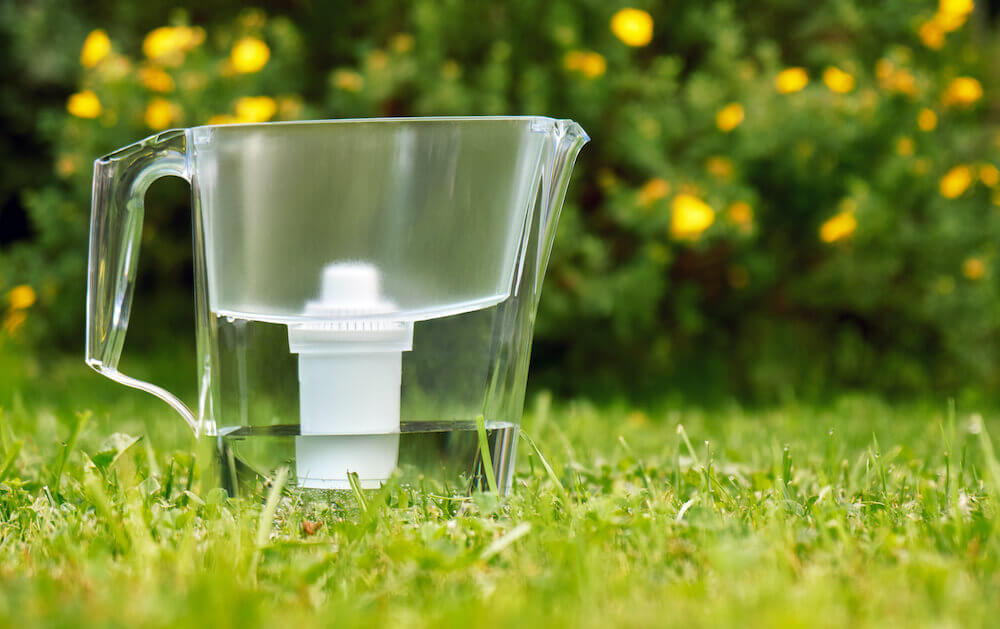
If you invest in a good quality water pitcher, it will also eliminate unwanted particles such as heavy metals, lead, salts, bacteria, and pesticides. Water pitchers usually use activated carbon for the filtration process. Many water pitchers also use ceramic filters or ion exchange resins to perform the job.
Pitcher water filters use gravity to go through with the filtration process, and hence, it takes a lot of time for them to filter water compared to faucet water filters. A pitcher filter may take 10-15 minutes to clean the water.
Pros of Water Filter Pitchers
Here are a few of the many benefits of water filter pitchers:
1. Good Smell & Taste of Water
Water pitchers filter your water to provide you with fresh and clean water that smells and tastes good.
2. Portable
Water filter pitchers are portable as they have a compact size. A water pitcher’s size makes it ideal for carrying it while traveling. Hence, you can take it anywhere from your office to your holidays.
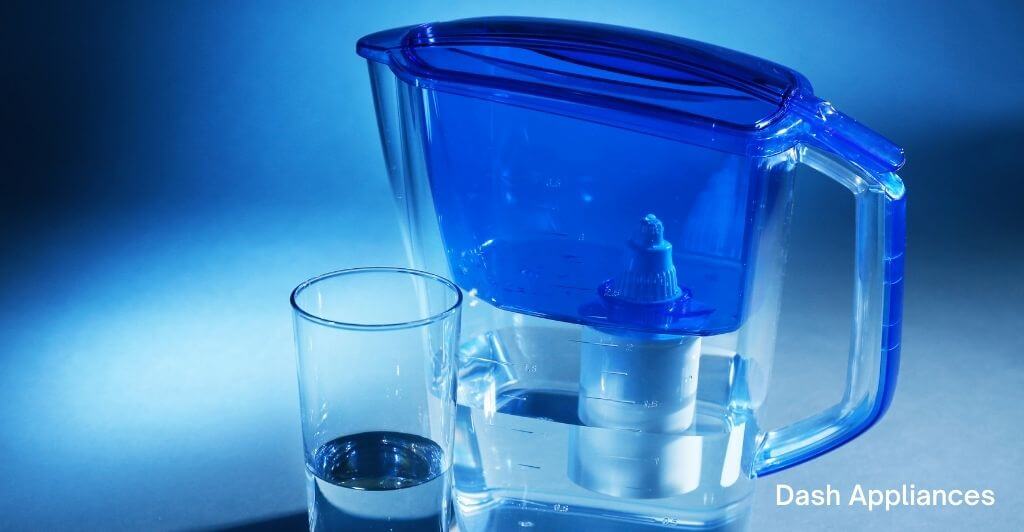
3. Easy Maintenance
Water pitchers are extremely convenient as you can use them easily, and they’re highly easy to maintain as well. You only need to clean them occasionally, and their cartridges need to be replaced at regular intervals.
4. Eliminates Unwanted Contaminants
The filter cartridges of water filter pitchers are made to eliminate numerous unwanted contaminants from the water.
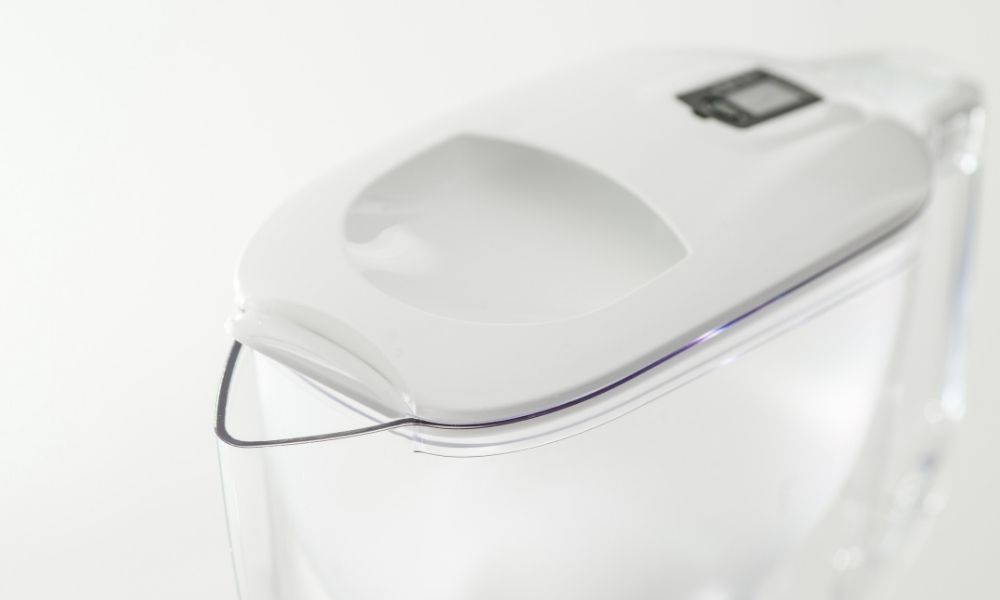
A high-quality water pitcher will successfully remove more than 200 harmful particles from the tap water, including:
- VOCs
- Lead
- Drug residues
- Microplastics
- Pesticides
- Fluoride
- Disinfection byproducts
- Chloramine
- Arsenic
- Chlorine
- Microorganisms
- Cadmium
- Perfluorinated chemicals
- Chromium
The best part about getting a water pitcher is their size. Water pitchers are compact, and they can fit into refrigerators, making it comfortable for you to get cold, fresh, and clean water.
Cons of Water Filter Pitchers
Here is a list of a few drawbacks of water filter pitchers:
1. Replacement of the Filters
A water pitcher’s filters need to be replaced at least five times a year. If you want good quality water at all times, you should change the filters regularly.
If you don’t replace the filters whenever necessary, you’ll end up exposing your family to several health issues and illnesses.
2. Difficulty in Cleaning
It can be difficult to clean water filter pitchers as they have an aesthetic look, but the gaps and nooks can become a problem when it comes to cleaning the pitcher.
You need to soak and scrub the pitchers time and again to ensure that mold doesn’t start growing on them. Moreover, cleaning will ensure the pitcher’s hygiene as well.
3. Capacity
As water filter pitchers are compact, they also have limited capacity. A water filter pitcher usually holds 8-12 cups of clean water on average. If the water pitcher is being used to serve only one person, its capacity should be enough.
On the contrary, if you have many members at home, the water pitcher may not be enough to fulfill everyone’s water needs at once.
Faucet Water Filters
As it may be clear by the name, faucet water filters directly get attached to the fixture at your home. These filters clean the water on demand, and it is very easy to install them. It will only take you 10-15 minutes to go through with a faucet filter’s installation process.
These filters also don’t require any permanent plumbing changes, making them appropriate for rentals. These filters will work efficiently, and they’ll ensure that you consume contaminant-free water at all times.
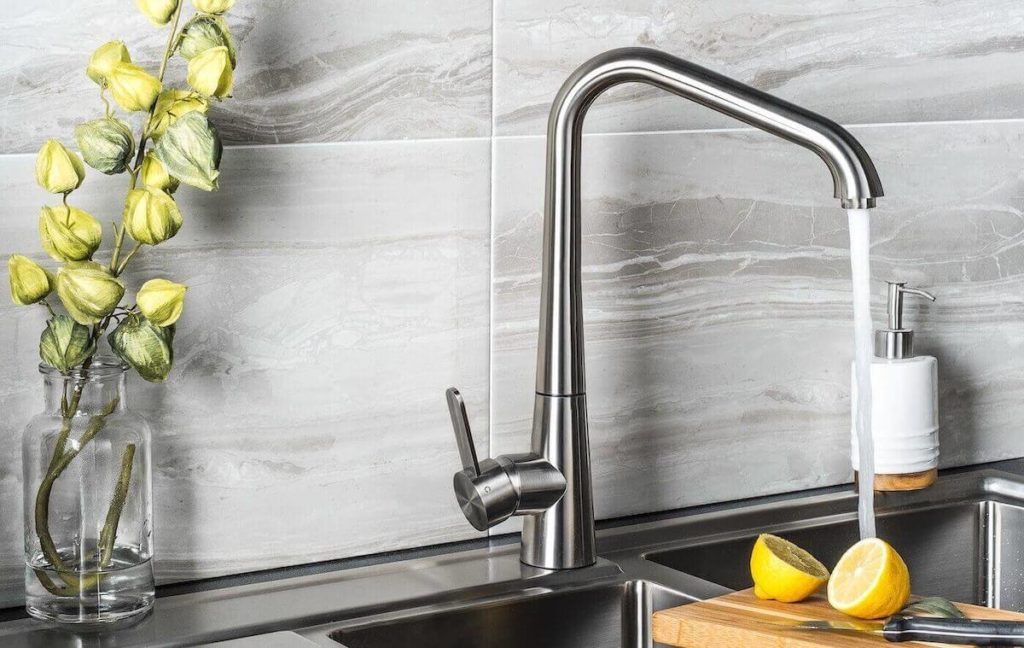
These filters use your house’s water pressure and force the water to flow through the filter. This means that a faucet filter cleans ½ gallon of water every minute.
Many faucet filters also come with a light that indicates when the filter needs a replacement. This feature ensures that you neither change the filter prematurely nor after it has lost its efficiency and effectiveness. If used regularly, the cartridge of a faucet filter usually lasts for two months.
Pros of Faucet Water Filters
Let’s take a look at a few benefits of having a faucet water filter installed at home:
1. Size
Faucet filters are compact in size, and they aren’t bulky. The best part about faucet filters is that they don’t occupy much space. Moreover, it is easy to maintain them, and they are portable.
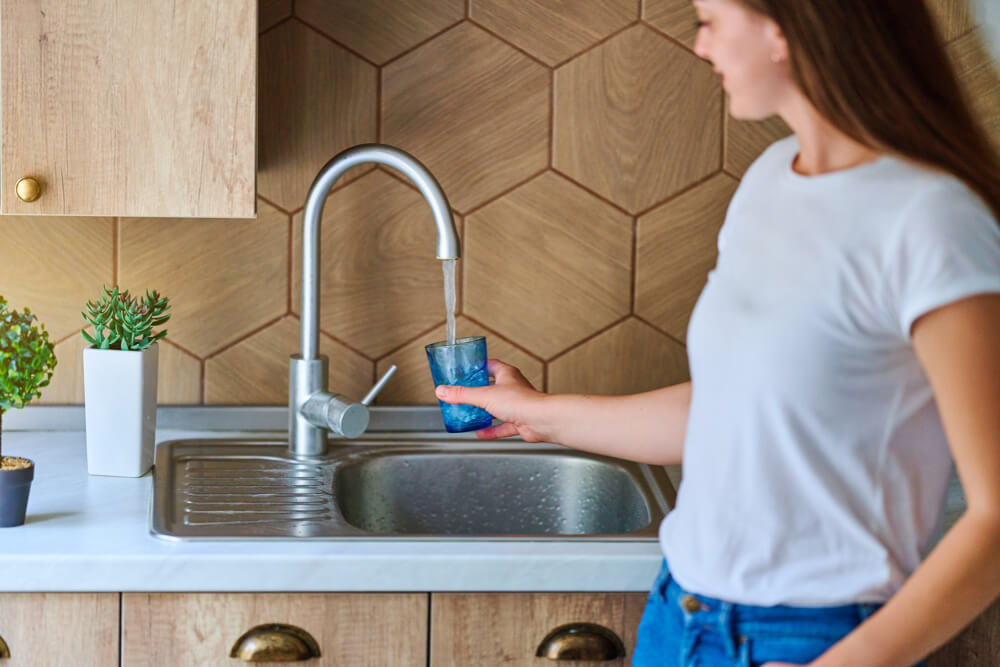
2. Water Anytime You Want
Faucet water filters are convenient as they don’t make you wait for the process to be completed before you can use clean water. Instead, they provide you with pure water as and when you need it.
3. Easy to Install
It is easy to install a faucet water filter as you won’t need the help of a professional to set it up.
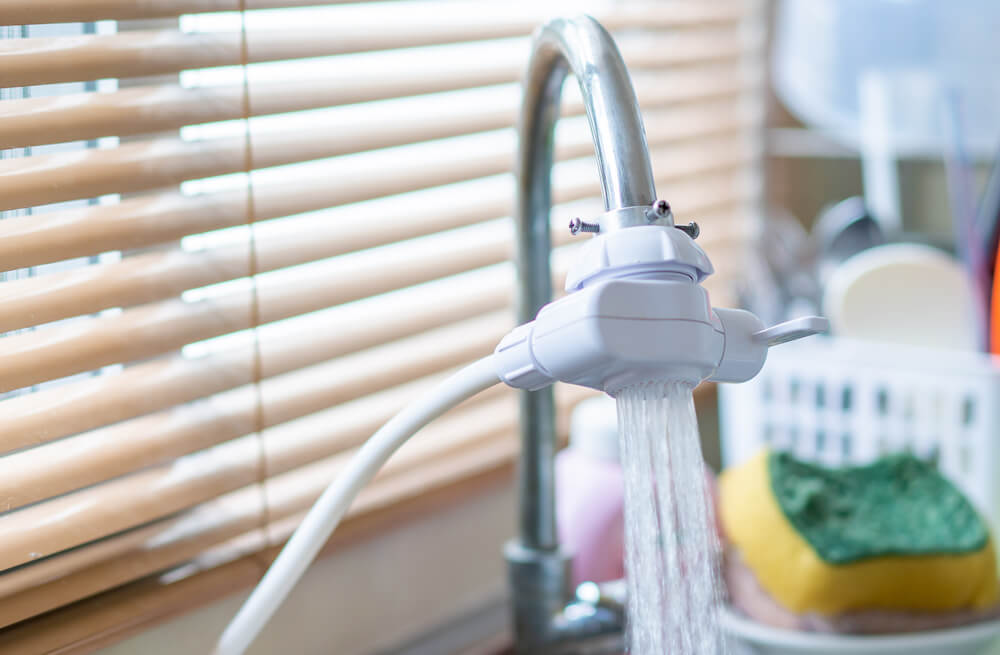
To install a faucet filter, all you need to do is get rid of the faucet’s aerator and twist an aerator from the filter.
Cons of Faucet Water Filters
Here is a list of a few issues associated with faucet water filters:
1. Requires Frequent Replacements
You’ll have to change the faucet filters once every few months. Frequent replacements can be exhausting, and they add to the costs.
2. Low Water Pressure
The water pressure of a faucet water filter is low compared to a whole house filtration system. When the cartridge of a faucet water filter gets clogged, it declines the water pressure.
3. Don’t Fit All Kinds of Faucets
One of the biggest problems associated with faucet water filters is that they aren’t compatible with all types of faucets. These filters usually only fit the standard-sized faucets.
Water Pitcher vs Faucet Filter — Which one Should you Choose?
If you don’t want to consider the compatibility issues that come with a faucet water filter, a water filter pitcher is the best option for you. With a water pitcher installed at your house, all you’ll have to do is fill it with water and wait for the bottom section to be filled with clean and pure water.
The only main drawback of a water filter pitcher is that it takes a long time to filter the water.
On the other hand, if you have a standard-sized faucet and don’t want to wait for the water to get filtered, you should go with a faucet water filter. Faucet water filters don’t take long to filter the water, and they provide pure water on demand.
Moreover, you can easily switch between unfiltered and filtered water anytime you want.
Conclusion
The type of water filter you use will depend upon your requirements and the size of the faucet you have installed at your home.
It is vital to get the right filter as although both of these filters give similar results, they work differently, and their installation process is different as well.
It would be best if you went through the pros and cons of each of these filters mentioned above, and we’re sure you’ll be able to make the right decision for yourself and your family.
FAQ
Will my water taste good after filtering it using a faucet filter?
Yes. Faucet filters make your water taste good, and they eliminate the foul smell present in water. The bad taste or odor in tap water can be due to hydrogen sulfide, zinc, and chlorine found in water.
What does tap water smell like?
Tap water often smells like sulfur or rotten eggs. This is because it contains hydrogen sulfide.
